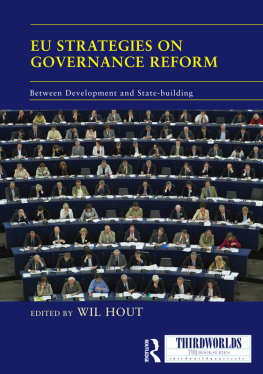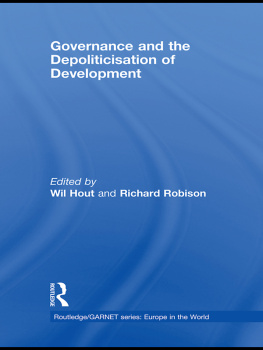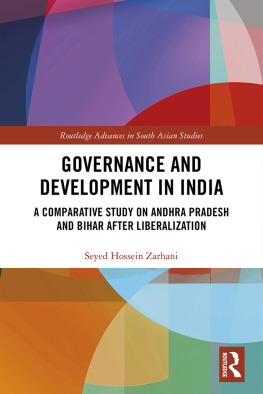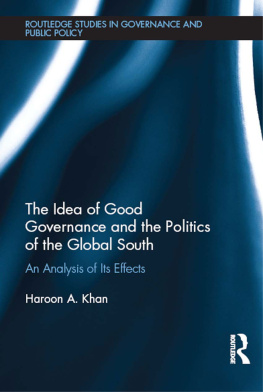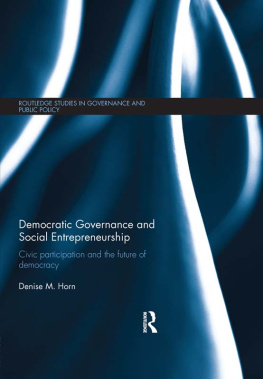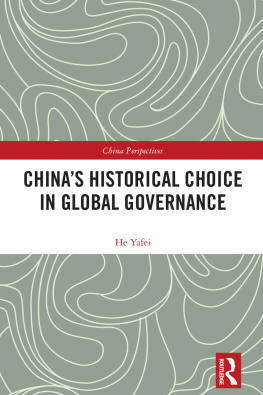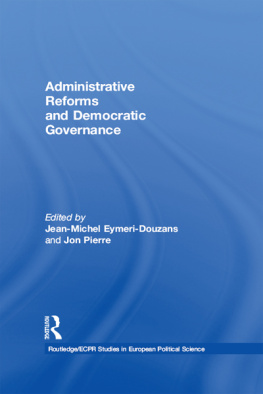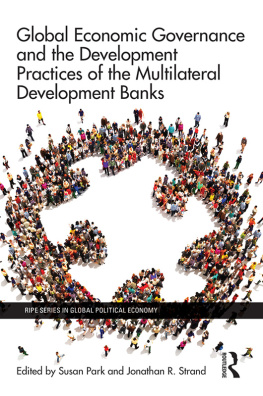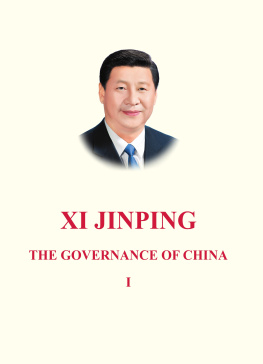EU Strategies on Governance Reform
This book discusses the European Unions approach to governance reform in its development assistance relationships with various groups of developing countries. A group of expert authors outline the general features of the position on governance taken by the EU, which is currently the major multilateral donor of development assistance, and discuss the implementation of EU policies in a set of cases: the group of African, Caribbean and Pacific (ACP) states, the New Partnership for Africas Development (NEPAD), Southeastern Europe, Central Asia, the Euro-Mediterranean, Latin America and fragile states.
The contributions to the book argue that the EUs position on governance reform, particularly since the adoption of the European Consensus on Development in 2005, has had distinctly neoliberal overtones. The EUs governance-related strategies have been instrumental to deepening market-based reform in aid-receiving countries. Policies on state-building adopted by the EU reflect mainly the interests of and ideas embraced by the EU and its member states. To an important extent, the rhetoric accompanying EU policies does not match with the political and social dynamics inherent in governance structures on the ground in many of its aid-recipient partner countries.
This book was published as a special issue of Third World Quarterly.
Wil Hout is Professor of Governance and International Political Economy at the International Institute of Social Studies, Erasmus University Rotterdam.
Thirdworlds
Edited by Shahid Qadir, University of London
THIRDWORLDS will focus on the political economy, development and cultures of those parts of the world that have experienced the most political, social, and economic upheaval, and which have faced the greatest challenges of the postcolonial world under globalisation: poverty, displacement and diaspora, environmental degradation, human and civil rights abuses, war, hunger, and disease.
THIRDWORLDS serves as a signifier of oppositional emerging economies and cultures ranging from Africa, Asia, Latin America, Middle East, and even those Souths within a larger perceived North, such as the U.S. South and Mediterranean Europe. The study of these otherwise disparate and discontinuous areas, known collectively as the Global South, demonstrates that as globalisation pervades the planet, the south, as a synonym for subalterity, also transcends geographical and ideological frontiers.
Terrorism and the Politics of Naming
Edited by Michael Bhatia
Reconstructing Post-Saddam Iraq
Edited by Sultan Barakat
From Nation-Building to State-Building
Edited by Mark T. Berger
Connecting Cultures
Edited by Emma Bainbridge
The Politics of Rights
Dilemmas for feminist praxis
Edited by Andrea Cornwall and Maxine Molyneux
The Long War Insurgency, Counterinsurgency and Collapsing States
Edited by Mark T. Berger and Douglas A. Borer
Market-led Agrarian Reform
Edited by Saturnino M. Borras, Jr.
After the Third World?
Edited by Mark T. Berger
Developmental and Cultural Nationalisms
Edited by Radhika Desai
Globalisation and Migration
New issues, new politics
Edited by Ronaldo Munck
Domestic and International Perspectives on Kyrgyzstans Tulip Revolution
Motives, mobilizations and meanings
Edited by Sarah Cummings
War and Revolution in the Caucasus
Georgia Ablaze
Edited by Stephen F. Jones
War, Peace and Progress in the 21st Century
Development, Violence and Insecurities
Edited by Mark T. Berger and Heloise Weber
Renewing International Labour Studies
Edited by Marcus Taylor
Youth in the Former Soviet South
Everyday Lives between Experimentation and Regulation
Edited by Stefan B. Kirmse
Political Civility in the Middle East
Edited by Frdric Volpi
The Transformation of Tajikistan
Sources of Statehood
Edited by John Heathershaw
Movement, Power and Place in Central Asia and Beyond
Contested Trajectories
Edited by Madeleine Reeves
People Power in an Era of Global Crisis
Rebellion, Resistance and Liberation
Edited by Barry K. Gills and Kevin Gray
EU Strategies on Governance Reform
Between Development and State-building
Edited by Wil Hout
First published 2013
by Routledge
2 Park Square, Milton Park, Abingdon, Oxon, OX14 4RN
Simultaneously published in the USA and Canada
by Routledge
711 Third Avenue, New York, NY 10017
Routledge is an imprint of the Taylor & Francis Group, an informa business
2013 Southseries Inc.
This book is a reproduction of Third World Quarterly, vol. 31, issue 1. The Publisher requests to those authors who may be citing this book to state, also, the bibliographical details of the special issue on which the book was based.
All rights reserved. No part of this book may be reprinted or reproduced or utilised in any form or by any electronic, mechanical, or other means, now known or hereafter invented, including photocopying and recording, or in any information storage or retrieval system, without permission in writing from the publishers.
Trademark notice: Product or corporate names may be trademarks or registered trademarks, and are used only for identification and explanation without intent to infringe.
British Library Cataloguing in Publication Data
A catalogue record for this book is available from the British Library
ISBN13: 978-0-415-62203-5
Publishers Note
The publisher would like to make readers aware that the chapters in this book may be referred to as articles as they are identical to the articles published in the special issue. The publisher accepts responsibility for any inconsistencies that may have arisen in the course of preparing this volume for print.
Andrew Bradley is a Director at the International Institute for Democracy and Electoral Assistance (IDEA) in Stockholm, Sweden. Previously he was the Assistant Secretary-General for Political Affairs and Human Development of the African, Caribbean and Pacific (ACP) Group of States, and a career diplomat serving in South African Embassies and Missions in Canada, Switzerland and Belgium. At the ACP Group, he was responsible for the maintenance of ACP-EU relations, bi- and multi-lateral negotiations, migration, human and social development, conflict prevention and resolution, and the promotion of democracy, human rights, governance and the rule of law. As a diplomat, he was involved in the discussions/negotiations that brought about democratic change in South Africa, participated in the negotiations for South Africas accession to the ACP Group and the Lom Convention (now Cotonou Agreement), and acted as member of the South African Negotiating Team for the South Africa-EU Trade, Development and Cooperation Agreement (TDCA).
Maurizio Carbone is Professor of International Development and Jean Monnet Professor of EU External Relations in the Department of Politics at the University of Glasgow. His research focuses on EU external relations and the politics of international development. He has published in various journals, including

